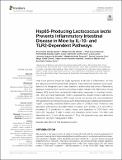| dc.contributor.author | Gomes-Santos, Ana Cristina | en_US |
| dc.contributor.author | de Oliveira, Rafael Pires | en_US |
| dc.contributor.author | Moreira, Thaís Garcias | en_US |
| dc.contributor.author | Castro-Junior, Archimedes Barbosa | en_US |
| dc.contributor.author | Horta, Bernardo Coelho | en_US |
| dc.contributor.author | Lemos, Luísa | en_US |
| dc.contributor.author | de Almeida, Leonardo Augusto | en_US |
| dc.contributor.author | Rezende, Rafael Machado | en_US |
| dc.contributor.author | Cara, Denise Carmona | en_US |
| dc.contributor.author | Oliveira, Sérgio Costa | en_US |
| dc.contributor.author | Azevedo, Vasco Ariston Carvalho | en_US |
| dc.contributor.author | Miyoshi, Anderson | en_US |
| dc.contributor.author | Faria, Ana Maria Caetano | en_US |
| dc.date.accessioned | 2017-03-28T23:50:22Z | |
| dc.date.issued | 2017 | en_US |
| dc.identifier.citation | Gomes-Santos, A. C., R. P. de Oliveira, T. G. Moreira, A. B. Castro-Junior, B. C. Horta, L. Lemos, L. A. de Almeida, et al. 2017. “Hsp65-Producing Lactococcus lactis Prevents Inflammatory Intestinal Disease in Mice by IL-10- and TLR2-Dependent Pathways.” Frontiers in Immunology 8 (1): 30. doi:10.3389/fimmu.2017.00030. http://dx.doi.org/10.3389/fimmu.2017.00030. | en |
| dc.identifier.issn | | en |
| dc.identifier.uri | http://nrs.harvard.edu/urn-3:HUL.InstRepos:31731801 | |
| dc.description.abstract | Heat shock proteins (Hsps) are highly expressed at all sites of inflammation. As they are ubiquitous and immunodominant antigens, these molecules represent good candidates for the therapeutic use of oral tolerance in autoimmune and chronic inflammatory diseases. Evidences from human and animal studies indicate that inflammatory bowel disease (IBD) results from uncontrolled inflammatory responses to intestinal microbiota. Hsps are immunodominant proteins expressed by several immune cells and by commensal bacteria. Using an IBD mouse model, we showed that oral pretreatment with genetically modified Lactococcus lactis that produces and releases Mycobacterium Hsp65, completely prevented DSS-induced colitis in C57BL/6 mice. Protection was associated with reduced pro-inflammatory cytokines, such as IFN-γ, IL-6, and TNF-α; increased IL-10 production in colonic tissue; and expansion of CD4+Foxp3+ and CD4+LAP+ regulatory T cells in spleen and mesenteric lymph nodes. This effect was dependent on IL-10 and toll-like receptor 2. Thus, this approach may open alternative options for long-term management of IBD. | en |
| dc.language.iso | en_US | en |
| dc.publisher | Frontiers Media S.A. | en |
| dc.relation.isversionof | doi:10.3389/fimmu.2017.00030 | en |
| dc.relation.hasversion | http://www.ncbi.nlm.nih.gov/pmc/articles/PMC5277002/pdf/ | en |
| dash.license | LAA | en_US |
| dc.subject | colitis | en |
| dc.subject | DSS | en |
| dc.subject | IL-10 | en |
| dc.subject | TLR2 | en |
| dc.subject | Hsp | en |
| dc.subject | | en |
| dc.title | Hsp65-Producing Lactococcus lactis Prevents Inflammatory Intestinal Disease in Mice by IL-10- and TLR2-Dependent Pathways | en |
| dc.type | Journal Article | en_US |
| dc.description.version | Version of Record | en |
| dc.relation.journal | Frontiers in Immunology | en |
| dash.depositing.author | Rezende, Rafael Machado | en_US |
| dc.date.available | 2017-03-28T23:50:22Z | |
| dc.identifier.doi | 10.3389/fimmu.2017.00030 | * |
| dash.authorsordered | false | |
| dash.contributor.affiliated | Rezende, Rafael | |


